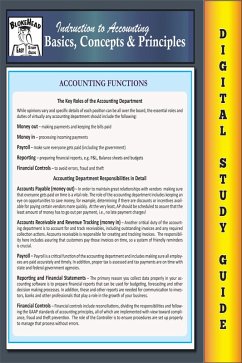
Principles of Accounting (eBook, ePUB)

PAYBACK Punkte
0 °P sammeln!
The book Principles of Accounting serves as a foundational guide to the basic concepts, principles, and practices of accounting. It is designed to help students and professionals develop a thorough understanding of accounting as a discipline and its importance in financial decision-making.Key Topics Covered:1. Introduction to Accounting The book begins by explaining the purpose of accounting, its role in business, and its importance in tracking financial performance. It introduces key concepts such as the accounting cycle and the distinction between financial and managerial accounting. 2. Acco...
The book Principles of Accounting serves as a foundational guide to the basic concepts, principles, and practices of accounting. It is designed to help students and professionals develop a thorough understanding of accounting as a discipline and its importance in financial decision-making.
Key Topics Covered:
1. Introduction to Accounting The book begins by explaining the purpose of accounting, its role in business, and its importance in tracking financial performance. It introduces key concepts such as the accounting cycle and the distinction between financial and managerial accounting.
2. Accounting Principles and Framework It outlines fundamental principles, such as the Generally Accepted Accounting Principles (GAAP) and the International Financial Reporting Standards (IFRS). These frameworks guide the preparation and presentation of financial statements.
3. The Accounting Equation and Double-Entry System A cornerstone of the book is the explanation of the accounting equation:
It also explores the double-entry bookkeeping system, where every transaction affects at least two accounts, ensuring accuracy.
4. Financial Statements The book details how to prepare and interpret the primary financial statements:
Income Statement: Reports revenues and expenses to show profitability.
Balance Sheet: Summarizes assets, liabilities, and equity at a given time.
Cash Flow Statement: Tracks cash inflows and outflows.
Statement of Changes in Equity: Highlights changes in ownership interest.
5. Adjusting Entries and Closing Process The process of adjusting journal entries to account for accruals, deferrals, and other non-cash transactions is explained. The book also covers the closing process to reset accounts at the end of a period.
6. Specialized Topics Advanced topics include inventory accounting, depreciation, internal controls, payroll accounting, and accounting for partnerships and corporations. These chapters delve into specific areas that require more detailed attention.
7. Managerial and Cost Accounting In addition to financial accounting, the book introduces managerial accounting concepts such as budgeting, cost behavior, and performance evaluation, aiding in internal decision-making.
Approach and Pedagogy:
The book employs clear explanations, real-world examples, and practical exercises to reinforce learning. Charts, tables, and illustrations are used to clarify complex topics. End-of-chapter questions and case studies help readers apply what they've learned.
Importance:
Principles of Accounting is invaluable for anyone starting their journey in accounting, as it provides the tools and knowledge necessary to understand and engage with financial data. It emphasizes accuracy, ethical practices, and the analytical skills needed to succeed in the field.
Key Topics Covered:
1. Introduction to Accounting The book begins by explaining the purpose of accounting, its role in business, and its importance in tracking financial performance. It introduces key concepts such as the accounting cycle and the distinction between financial and managerial accounting.
2. Accounting Principles and Framework It outlines fundamental principles, such as the Generally Accepted Accounting Principles (GAAP) and the International Financial Reporting Standards (IFRS). These frameworks guide the preparation and presentation of financial statements.
3. The Accounting Equation and Double-Entry System A cornerstone of the book is the explanation of the accounting equation:
It also explores the double-entry bookkeeping system, where every transaction affects at least two accounts, ensuring accuracy.
4. Financial Statements The book details how to prepare and interpret the primary financial statements:
Income Statement: Reports revenues and expenses to show profitability.
Balance Sheet: Summarizes assets, liabilities, and equity at a given time.
Cash Flow Statement: Tracks cash inflows and outflows.
Statement of Changes in Equity: Highlights changes in ownership interest.
5. Adjusting Entries and Closing Process The process of adjusting journal entries to account for accruals, deferrals, and other non-cash transactions is explained. The book also covers the closing process to reset accounts at the end of a period.
6. Specialized Topics Advanced topics include inventory accounting, depreciation, internal controls, payroll accounting, and accounting for partnerships and corporations. These chapters delve into specific areas that require more detailed attention.
7. Managerial and Cost Accounting In addition to financial accounting, the book introduces managerial accounting concepts such as budgeting, cost behavior, and performance evaluation, aiding in internal decision-making.
Approach and Pedagogy:
The book employs clear explanations, real-world examples, and practical exercises to reinforce learning. Charts, tables, and illustrations are used to clarify complex topics. End-of-chapter questions and case studies help readers apply what they've learned.
Importance:
Principles of Accounting is invaluable for anyone starting their journey in accounting, as it provides the tools and knowledge necessary to understand and engage with financial data. It emphasizes accuracy, ethical practices, and the analytical skills needed to succeed in the field.
Dieser Download kann aus rechtlichen Gründen nur mit Rechnungsadresse in A, B, CY, CZ, D, DK, EW, E, FIN, F, GR, H, IRL, I, LT, L, LR, M, NL, PL, P, R, S, SLO, SK ausgeliefert werden.













